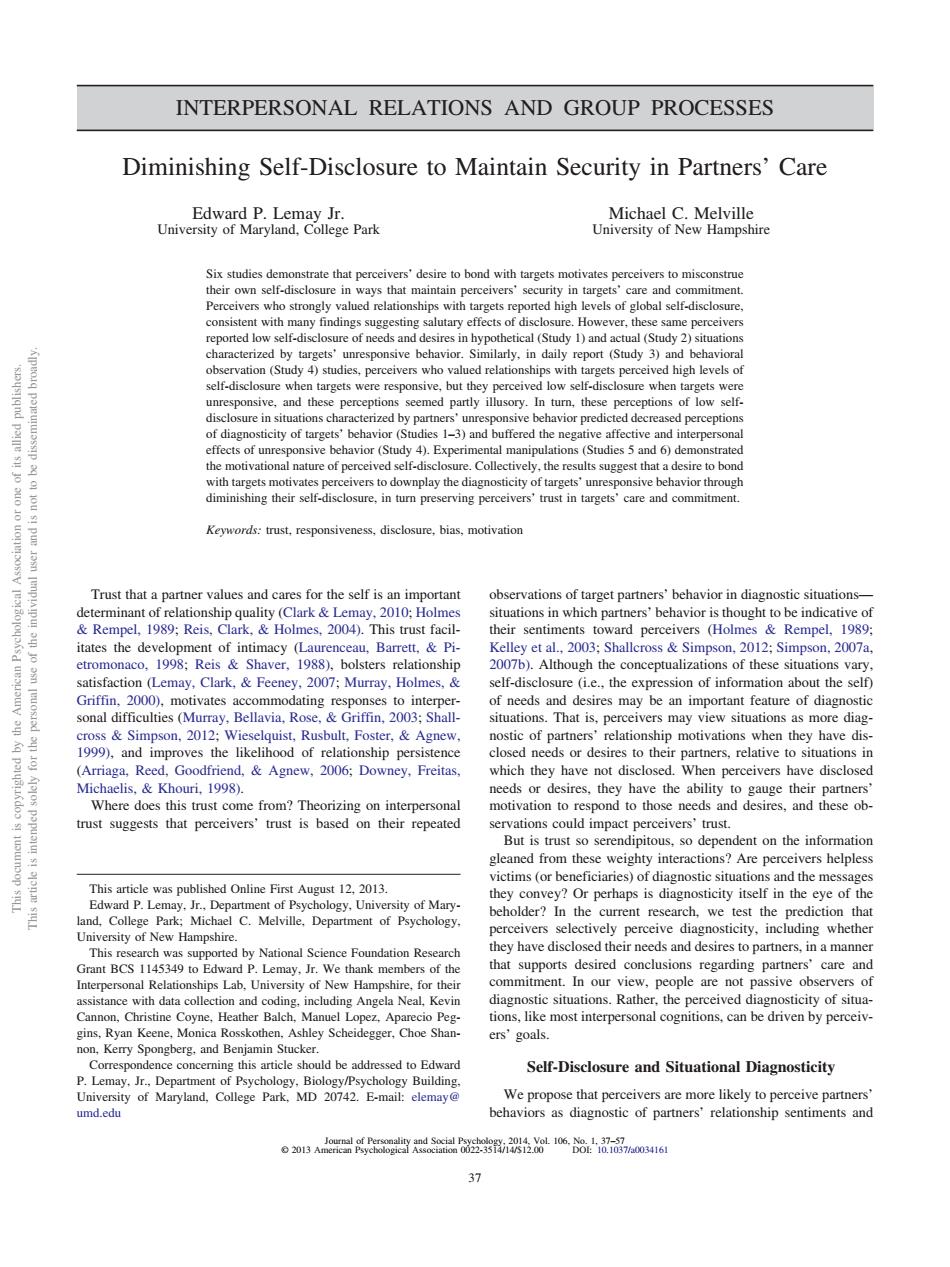正在加载图片...

INTERPERSONAL RELATIONS AND GROUP PROCESSES Diminishing Self-Disclosure to Maintain Security in Partners'Care UaiverPark UMichee Six studies desire to bond with targ y find ary effe larly.in Study 3 dhiehlevecO lf-di r of tar ive and s or ons (St Keywords:trust.responsiveness.disclosure.bias,motivation Trust that a partner values and cares for the self is an importan observations of target partners'behavior in diagnostic situation uations in which partn tates the dev intimacy (Lauren Barrett.P 0n,201 2007g or the 2007:M 000.n ommo ating respo and desirs of p Michaelis.Kh y eeds or de ation to ld pon to those nee But is trust s so dependent on the information Are per helples d the he onv v.Un ted by National Science Foundation Res ey have disclosed th ir needs and desires to partners,in a manne may. members of h data colle Angel ers'goals ning th Self-Disclosure and Situational Diagnosticity INTERPERSONAL RELATIONS AND GROUP PROCESSES Diminishing Self-Disclosure to Maintain Security in Partners’ Care Edward P. Lemay Jr. University of Maryland, College Park Michael C. Melville University of New Hampshire Six studies demonstrate that perceivers’ desire to bond with targets motivates perceivers to misconstrue their own self-disclosure in ways that maintain perceivers’ security in targets’ care and commitment. Perceivers who strongly valued relationships with targets reported high levels of global self-disclosure, consistent with many findings suggesting salutary effects of disclosure. However, these same perceivers reported low self-disclosure of needs and desires in hypothetical (Study 1) and actual (Study 2) situations characterized by targets’ unresponsive behavior. Similarly, in daily report (Study 3) and behavioral observation (Study 4) studies, perceivers who valued relationships with targets perceived high levels of self-disclosure when targets were responsive, but they perceived low self-disclosure when targets were unresponsive, and these perceptions seemed partly illusory. In turn, these perceptions of low selfdisclosure in situations characterized by partners’ unresponsive behavior predicted decreased perceptions of diagnosticity of targets’ behavior (Studies 1–3) and buffered the negative affective and interpersonal effects of unresponsive behavior (Study 4). Experimental manipulations (Studies 5 and 6) demonstrated the motivational nature of perceived self-disclosure. Collectively, the results suggest that a desire to bond with targets motivates perceivers to downplay the diagnosticity of targets’ unresponsive behavior through diminishing their self-disclosure, in turn preserving perceivers’ trust in targets’ care and commitment. Keywords: trust, responsiveness, disclosure, bias, motivation Trust that a partner values and cares for the self is an important determinant of relationship quality (Clark & Lemay, 2010; Holmes & Rempel, 1989; Reis, Clark, & Holmes, 2004). This trust facilitates the development of intimacy (Laurenceau, Barrett, & Pietromonaco, 1998; Reis & Shaver, 1988), bolsters relationship satisfaction (Lemay, Clark, & Feeney, 2007; Murray, Holmes, & Griffin, 2000), motivates accommodating responses to interpersonal difficulties (Murray, Bellavia, Rose, & Griffin, 2003; Shallcross & Simpson, 2012; Wieselquist, Rusbult, Foster, & Agnew, 1999), and improves the likelihood of relationship persistence (Arriaga, Reed, Goodfriend, & Agnew, 2006; Downey, Freitas, Michaelis, & Khouri, 1998). Where does this trust come from? Theorizing on interpersonal trust suggests that perceivers’ trust is based on their repeated observations of target partners’ behavior in diagnostic situations— situations in which partners’ behavior is thought to be indicative of their sentiments toward perceivers (Holmes & Rempel, 1989; Kelley et al., 2003; Shallcross & Simpson, 2012; Simpson, 2007a, 2007b). Although the conceptualizations of these situations vary, self-disclosure (i.e., the expression of information about the self) of needs and desires may be an important feature of diagnostic situations. That is, perceivers may view situations as more diagnostic of partners’ relationship motivations when they have disclosed needs or desires to their partners, relative to situations in which they have not disclosed. When perceivers have disclosed needs or desires, they have the ability to gauge their partners’ motivation to respond to those needs and desires, and these observations could impact perceivers’ trust. But is trust so serendipitous, so dependent on the information gleaned from these weighty interactions? Are perceivers helpless victims (or beneficiaries) of diagnostic situations and the messages they convey? Or perhaps is diagnosticity itself in the eye of the beholder? In the current research, we test the prediction that perceivers selectively perceive diagnosticity, including whether they have disclosed their needs and desires to partners, in a manner that supports desired conclusions regarding partners’ care and commitment. In our view, people are not passive observers of diagnostic situations. Rather, the perceived diagnosticity of situations, like most interpersonal cognitions, can be driven by perceivers’ goals. Self-Disclosure and Situational Diagnosticity We propose that perceivers are more likely to perceive partners’ behaviors as diagnostic of partners’ relationship sentiments and This article was published Online First August 12, 2013. Edward P. Lemay, Jr., Department of Psychology, University of Maryland, College Park; Michael C. Melville, Department of Psychology, University of New Hampshire. This research was supported by National Science Foundation Research Grant BCS 1145349 to Edward P. Lemay, Jr. We thank members of the Interpersonal Relationships Lab, University of New Hampshire, for their assistance with data collection and coding, including Angela Neal, Kevin Cannon, Christine Coyne, Heather Balch, Manuel Lopez, Aparecio Peggins, Ryan Keene, Monica Rosskothen, Ashley Scheidegger, Choe Shannon, Kerry Spongberg, and Benjamin Stucker. Correspondence concerning this article should be addressed to Edward P. Lemay, Jr., Department of Psychology, Biology/Psychology Building, University of Maryland, College Park, MD 20742. E-mail: elemay@ umd.edu This document is copyrighted by the American Psychological Association or one of its allied publishers. This article is intended solely for the personal use of the individual user and is not to be disseminated broadly. Journal of Personality and Social Psychology, 2014, Vol. 106, No. 1, 37–57 © 2013 American Psychological Association 0022-3514/14/$12.00 DOI: 10.1037/a0034161 37